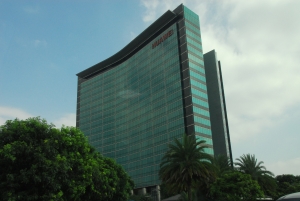Huawei updates enterprise server and networking range

Huawei has announced a new family of servers supported by Intel's just-released enterprise-grade Xeon E5 processor series, and has updated its networking portfolio.

Huawei has continued its push into the private datacentre with a comprehensive update to its networking and server equipment. Photo credit: David Meyer
Huawei's TecalTM V2 servers were announced at CeBIT on Wednesday and are available in configurations that are aimed at all sizes of business. The servers use Intel Xeon E5 processors.
In "the next decades we will witness Huawei's strategic development from computer technology, to information computer technology", David He, president of marketing for Huawei Enterprise, said at the press conference. The company will "achieve this by leveraging Huawei's R&D capabilities and technical expertise to develop and provide a comprehensive range of ICT solutions and service for enterprise customers in industries across government, public sector [and] transport".
The TecalTM V2 servers come in rack, blade and high-density form factors. Huawei said in a statement that the servers consume five to 10 percent less energy than similar products on the market.
The blade server comes with two I/O expansion slots that could be used for additional networking or storage cards, while the dual-socket cabinet server comes with pre-installed hardware and cable which, Huawei says, trims deployment times by over 62 percent.
The dual-socket cabinet server comes in two variants with either eight or ten 2.5-inch SAS/SATA drive bays to give it enough local storage to support virtualised environments. All the servers excluding the blade server come with between one and five PCIe slots giving administrators the ability to plug in additional components, such as PCIe-linked flash cards made by companies like EMC, Fusion-io and Dell.
HP, Dell, IBM, Hitachi and Fujitsu all recently released servers based around the new Xeon range.
The servers are built by Huawei's Enterprise division, which the company formed in 2011 to help it push into private datacentres and out of its core competency in networking equipment for telecommunications companies.
The company hopes to become a major supplier of servers to businesses and large cloud operators, and also has ambitions to host corporate data within its own datacentres.
Huawei has had to deal with an atmosphere of distrust from governments in the US and Europe. US legislators have blocked Huawei's attempts to take control of US technology companies, while the company sought to assuage UK concerns over the security of its hardware by setting up a test centre with UK intelligence service GCHQ.
Networking equipment
On Thursday the company announced updated networking router and switch equipment with three high-end switches, eight mid-range switches and seven enterprise access routers.
The S9700 Series of Terabit Routing Switches are targeted at enterprises that want to provide large-capacity wireless networks, cloud computing and high-definition video services. The S9700 Series has an integrated firewall card to authenticate, authorise and track access users according to pre-set security policies. They also use a variable current chip to dynamically adjust power consumption according to use, which can reduce the total amount of electricity consumed by as much as 11 percent, Huawei said.
The S5700-LI Series Gigabit Switches are focused on medium-sized companies. The switches have a host of integrated security features to protect against distributed denial of service (DDoS) attacks and to make sure that users are closely tied to the IP and MAC addresses of their devices.
The S5700-LI Series has 'intelligent stacking', or iStack, which lets multiple switches be chained together into a large virtual switch made up of a master switch, backup switch and various slave switches. The switches also have redundant power supplies.
Huawei declined to give details about the types of hardware it was using in its new networking equipment. When asked whether it had integrated massively multicore networking chips from Santa Clara start-up Tilera, John Roese, the company's general manager for its North American research and development centre, Futurewei Technologies Inc, said: "We look at almost every technology in the market."
Roese told ZDNet UK that because Huawei's major chip partner is Intel, it would not disclose if it was using chips from other vendors.
"Is Huawei a very open-minded consumer of silicon?" Roese said. "The answer is: absolutely, yes, because our vested interest is Huawei... We use the best technology available... If you assume we only use tier one suppliers of silicon that would be wrong."
Pricing and availability for the servers and networking equipment were not disclosed.
Get the latest technology news and analysis, blogs and reviews delivered directly to your inbox with ZDNet UK's newsletters.